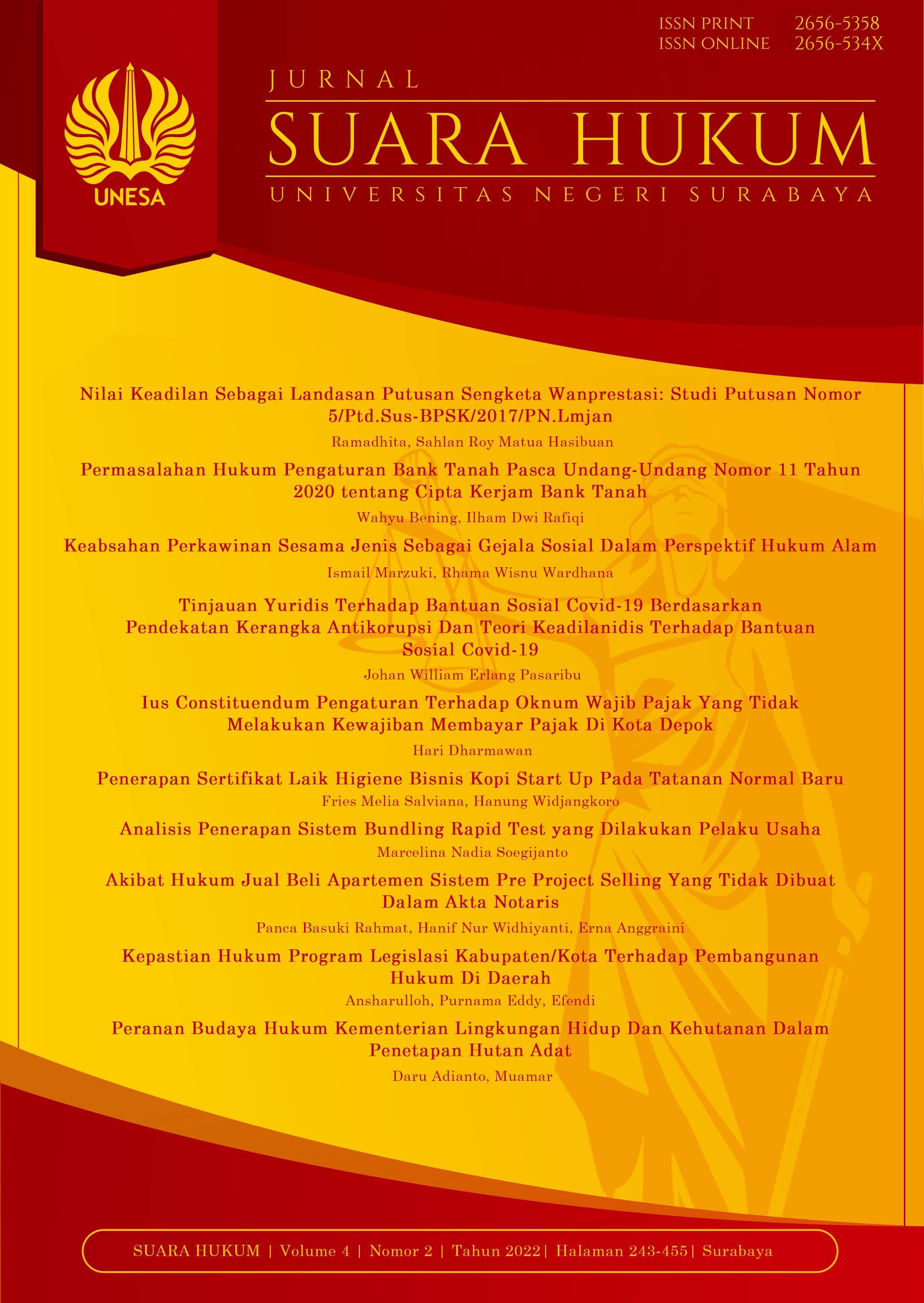Permasalahan Hukum Pengaturan Bank Tanah Pasca Undang-Undang Nomor 11 Tahun 2020 tentang Cipta Kerja
DOI:
https://doi.org/10.26740/jsh.v4n2.p265-298Abstract
Land problems in Indonesia are increasing along with the presence of Law Number 11 of 2020 on Job Creation, one of which is the issue of Land Bank Regulations. This paper will examine how the problematics of setting up the Land Bank are, starting from institutional problems and legal issues in particular. This paper uses a normative legal research method using a statutory and conceptual approach. The results of the study indicate that the presence of the Land Bank Agency has a great potential to cause overlapping authorities between institutions in the land sector. The authority of the Land Bank Agency in the management and acquisition of land was previously also owned by the Ministry of ATR/BPN, so this causes an overlap between the two institutions. Other legal issues, relating to the orientation and substance of the Land Bank Agency. Based on the Job Creation Law, the orientation of the Land Bank is more on investment and economic development that contains risks. The problematic Land Bank arrangements in the Employment Creation Law and the Land Bank PP have the potential to conflict with the goals of agrarian reform and constitutionality in the agrarian sector.
References
Ali, Z. (2016). Metode Penelitian Hukum. Sinar Grafika.
Amin, R. I. (2020). Pendekatan Sosiologi Hukum Dalam Memahami Konflik Peraturan Perundang-Undangan Di Indonesia. Jurnal Pascasarjana Hukum UNS, VIII(2), 210.
Arisaputa, M. I. (2015). Reforma Agraria di Indonesia. Sinar Grafika.
Darmawan, A. (2020). Politik Hukum Omnibus Law Dalam Konteks Pembangunan Ekonomi Indonesia. Indonesian Journal of Law and Policy Studies, 1(1), 13. https://doi.org/10.31000/ijlp.v1i1.2655
Fauzi, H. A. Z. dan A. M. (2021). Dampak Sosial Omnibus Law Cipta Kerja Perspektif Sosiologi Hukum. Jurnal Hukum Dan Kemanusiaan, 15(1), 95.
Forsyth, H. W. R. W. and C. F. (1994). Administrative law. Oxford University Press.
Hari Candra, A. K. (2020). Peluang dan Tantangan Bank Tanah menuju Pemukiman berwawasan Lingkungan di Indonesia. Jurnal Ekonomi Dan Bisnis Islam, 5(2), 6. https://doi.org/http://dx.doi.org/10.15548/jebi.v5i2.274
Izziyana, O. S. M. & W. V. (2020). Konsep Omnibus Law dan Permasalahan RUU Cipta Kerja. Rechstaat Nieuw, 1(1), 15.
Mamud?i, S. S. dan S. (1985). Penelitian Hukum N?rmatif. Rajawali Pers.
Purnadi P. & A. Ridwan H. (1984). Sendi-Sendi Hukum Agraria. Ghalia Indonesia.
R, Ridwan. H. (2002). Hukum Administrasi Negara. Raja Grafindo Persada.
Rahman, N. F. (2016). Bersaksi Untuk Pebaharuan Agraria (dari tuntutan local hingga kecenderungan Global). INISISTPress.
Santoso, U. (2010). Hukum Agraria dan Hak-Hak Atas Tanah. Prenada Media Group.
Soerodjo, I. (2014). Hukum Pertanahan Hak Pengelolaan atas Tanah (HPL) Eksistensi, Pengaturan dan Praktik (Cetakan II). Laksbang Mediatama.
Sumardjono, M. S. (2018). Regulasi Pertanahan dan Semangat Keadilan Agraria. STPN Press.
Winanmo, N. B. (2008). Penyalahgunaan Wewenang dan Tindak Pidana Korupsi. Laksbang Mediatama.
Downloads
Published
Issue
Section
License
Copyright (c) 2023 Wahyu Bening, Ilham Dwi Rafiqi

This work is licensed under a Creative Commons Attribution-NonCommercial 4.0 International License.
 Abstract views: 932
,
Abstract views: 932
, PDF Downloads: 3194
PDF Downloads: 3194




